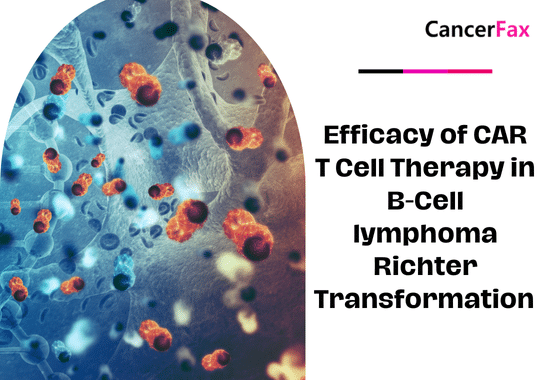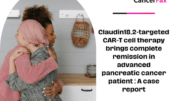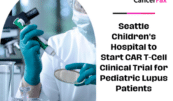Efficacy of CAR T Cell Therapy in B-Cell lymphoma Richter Transformation
What is the Richter transformation?
Richter transformation is an infrequent but not rare occurrence when an aggressive B-cell lymphoma develops in people with chronic lymphocytic leukemia or small lymphocytic lymphoma. The prognosis is bleak, with survival typically ranging from a few months to a couple of years. A significant number of patients have rapid improvement following initial immunochemotherapy treatment. However, there are new and innovative treatments that are expected to become available in the near future. In order to give a timely diagnosis and suitable treatment, it is vital for advanced practitioners to have awareness and expertise of this ailment.
CAR T Cell therapy
A clinical trial from the past that was published in the Journal of Clinical Oncology discovered that some CD19-directed CAR T-cell treatments, which are approved by the FDA to treat non-Hodgkin lymphoma, worked well in treating patients with Richter transformation.
The patients who experienced Richter transformation (n = 69) had a median progression-free survival (PFS) of 4.7 months (95% CI, 2.0-6.9) after receiving CAR T-cell therapy infusion. The median follow-up period was 24 months. The one-year and two-year progression-free survival (PFS) rates were 35.7% (95% confidence interval [CI], 24.3%-47.3%) and 28.9% (95% CI, 17.8%-40.8%), respectively. In addition, patients had a median overall survival (OS) of 8.5 months (95% CI, 5.1-25.4), with 1- and 2-year OS rates of 42.9% (95% CI, 30.7%-54.4%) and 38.3% (95% CI, 26.2%-50.3%), respectively.
The clinical study
Out of the 66 patients that were evaluated for response assessment, 3 patients died before the assessment due to adverse effects (AEs) following the infusion of CAR T-cell therapy. The total response rate was 63%, with a 46% rate of complete response (CR) and a 17% rate of partial response (PR).
The median response time was 27.6 months (95% CI, 14.5-NR) for patients who achieved complete response (CR), compared to 2.1 months (95% CI, 1.0-3.3) for those who obtained partial response (PR). In addition, one patient had stable disease, whereas 30% of patients suffered disease progression, specifically in the central nervous system for three individuals.
The study was conducted at 12 academic centers and included patients with Richter transformation who underwent CAR T-cell therapy. The patients were treated with either axicabtagene ciloleucel (axi-cel; Yescarta; n = 44; 64%), tisagenlecleucel (tisa-cel; Kymriah; n = 17; 25%), lisocabtagene maraleucel (liso-cel; Breyanzi; n = 7; 10%), or brexucabtagene autoleucel (brexu-cel; Tecartus; n = 1; 1%).
The study was retrospective in nature and involved multiple centers across different countries. Richter transition refers to the occurrence of large B-cell lymphoma (LBCL) in individuals who have previously been diagnosed with or are now diagnosed with chronic lymphocytic leukemia (CLL). In addition, those diagnosed with Hodgkin lymphoma or other subtypes of Richter transformation were not part of the study.
The study comprised patients with a median age of 56 years (range, 23-74) at the time of CLL diagnosis, 63 years (range, 26-80) at the time of Richter transformation diagnosis, and 64 years (range, 27-80) at the time of CAR T-cell therapy infusion. Most of the patients were men (63.8%), had been treated for CLL before Richter transformation (82.6%), did not have an IGHV mutation when they were diagnosed with CLL (86.7%), and had a complicated karyotype when they were diagnosed with Richter transformation (65.5%). Upon CLL diagnosis, individuals exhibited a median of 3 karyotypic abnormalities, with a range of 0 to 20.
With regards to cytogenetics in Richter transformation diagnosis, 12 out of 29 patients exhibited a 17p deletion, whereas 19 out of 29 patients had a complicated karyotype. There were also diseases where TP53 was changed in 14 of the 24 patients, NOTCH1 was changed in 4 of the 19 patients, MYC was moved in 8 of the 40 patients, and/or MYC was overexpressed in 29 of the 52 patients.
The largest lymph node had a median size of 3.5 cm, with a range of 0.7-16.0 cm. Patients underwent a median of 2 lines of therapy for Richter transformation, with a range of 0-7. Additionally, the majority of patients (62.3%) had previously received treatment with a BTK inhibitor or BCL2 inhibitor for both CLL and Richter transformation.
The supplementary information indicated that the estimated non-relapse mortality rates were 7.3% (95% confidence interval [CI], 2.7%-15.0%) after 3 months and 13.4% (95% CI, 6.5%-22.8%) at 12 months after the infusion. Twenty-seven patients had a post-treatment examination to determine the presence of minimal residual disease (MRD) in chronic lymphocytic leukemia (CLL).
Among the 22 patients who had no detectable MRD in their blood or bone marrow, the median progression-free survival (PFS) was 20.3 months (ranging from 6.6 to not reached), and the median overall survival (OS) was 38.4 months (ranging from 8.6 to not reached).
It was discovered that higher levels of lactate dehydrogenase and c-reactive protein at the start of the study were still linked to a shorter progression-free survival (PFS) time after CAR T infusion. Adam S. Kittai, MD, the primary author of the study and an associate professor of medicine specializing in hematology and medical oncology at Mount Sinai in New York, New York, together with his coauthors, stated in the paper.
A higher number of previous treatments for Richter transformation, a higher baseline tumor Ki67 proliferation index, and higher baseline levels of LDH and CRP were all linked to a shorter overall survival (OS) after CAR T-cell therapy infusion on the multivariable analysis.
Safety profile
With regards to safety, significant adverse events (AEs) of grade 3 or higher were cytokine release syndrome (16%), immunological effector cell–associated neurotoxicity syndrome (ICANS; 37%), infection (20.3%), neutropenia (87.0%), and thrombocytopenia (71.0%). Febrile neutropenia was observed in 66.7% of the patients. Grade 3 or higher ICANS was observed in 43% of patients who received axi-cel or brexu-cel, and in 25% of patients who received tisa-cel or liso-cel.
“This representative cohort exemplifies the practicality and effectiveness of CAR T-cell] therapy for a highly difficult-to-treat illness.” Further efforts are required to improve patient selection, bridging therapy, and post-CAR T maintenance therapy in order to boost effectiveness and minimize toxicity.
Similar to Chimeric Agent Receptor (CAR T-cell) therapy in LBCL, infection continues to be the primary reason for non-relapse death. It is crucial to prioritize anti-infective prophylaxis and take necessary precautions to reduce risks associated with COVID-19. The study authors stated that our observations provide evidence for the further investigation of CAR T-cell therapy for Richter transformation through prospective clinical studies.
The researchers also said that while CAR T therapy has been linked to lower complete response rates (CRs) in chronic lymphocytic leukemia (CLL), Richter transformation is not the same as CLL immunologically. When you put these results from the past study together with the other information, it seems that patients who have already been treated for Richter transformation may be able to get the same rates of remission with CAR T-cell therapy as patients with LBCL.
Susan Hau is a distinguished researcher in the field of cancer cell therapy, with a particular focus on T cell-based approaches and cancer vaccines. Her work spans several innovative treatment modalities, including CAR T-cell therapy, TIL (Tumor-Infiltrating Lymphocyte) therapy, and NK (Natural Killer) cell therapy.
Hau's expertise lies in cancer cell biology, where she has made significant contributions to understanding the complex interactions between immune cells and tumors.
Her research aims to enhance the efficacy of immunotherapies by manipulating the tumor microenvironment and exploring novel ways to activate and direct immune responses against cancer cells.
Throughout her career, Hau has collaborated with leading professors and researchers in the field of cancer treatment, both in the United States and China.
These international experiences have broadened her perspective and contributed to her innovative approach to cancer therapy development.
Hau's work is particularly focused on addressing the challenges of treating advanced and metastatic cancers. She has been involved in clinical trials evaluating the safety and efficacy of various immunotherapy approaches, including the promising Gamma Delta T cell therapy.
- Comments Closed
- June 17th, 2024






B-cell malignancy breakthrough, CAR-T clinical outcomes, CAR-T for Richter transformation, CD19 CAR-T efficacy, CLL to aggressive lymphoma, DLBCL transformation therapy, Refractory lymphoma options, Richter syndrome treatment
CancerFax is the most trusted online platform dedicated to connecting individuals facing advanced-stage cancer with groundbreaking cell therapies.
Send your medical reports and get a free analysis.
🌟 Join us in the fight against cancer! 🌟
Привет,
CancerFax — это самая надежная онлайн-платформа, призванная предоставить людям, столкнувшимся с раком на поздних стадиях, доступ к революционным клеточным методам лечения.
Отправьте свои медицинские заключения и получите бесплатный анализ.
🌟 Присоединяйтесь к нам в борьбе с раком! 🌟